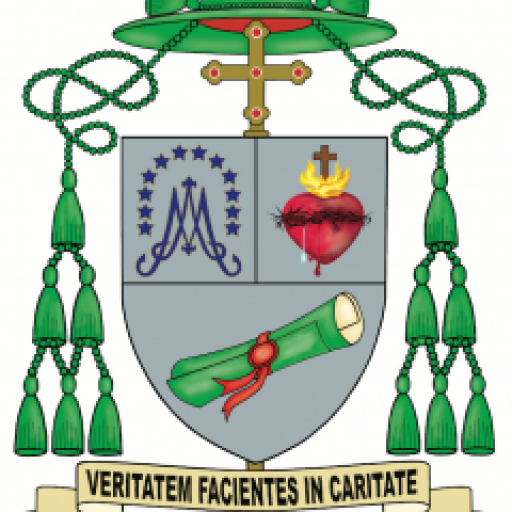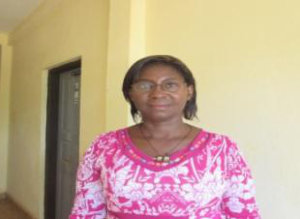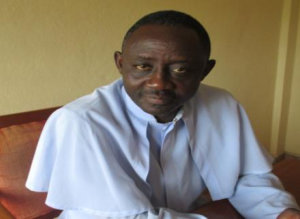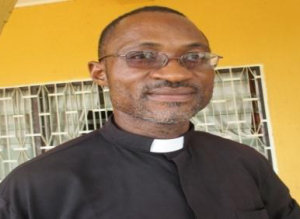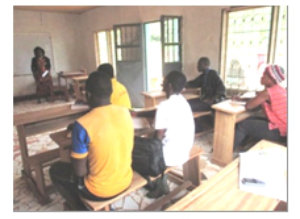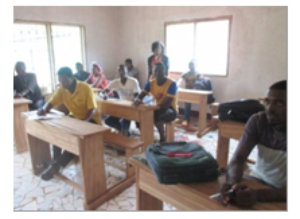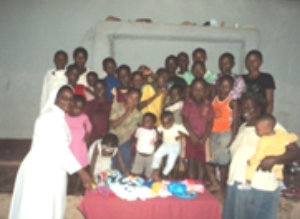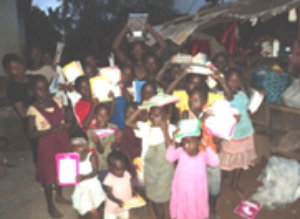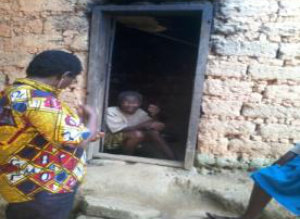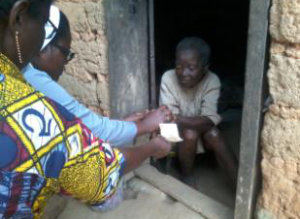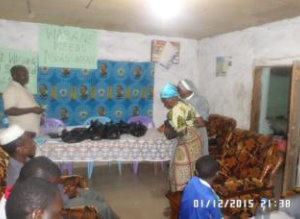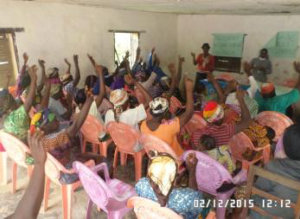CODAS/CARITAS
OBJECTIVE
General:
Codas-Caritas Mamfe is a development service of the Catholic Church in the Diocese of Mamfe; her principal function is to create social welfare/Caritas commissions in the various parishes in order to form a Diocesan network within the diocese to assist as a priority the underprivileged in the society, irrespective of religion, sex, and tribe.
OUR VISION
It is base on the Evangelization and the social teaching of the Church. CODAS-Caritas of the Diocese of Mamfe has a vision to become an organization of a diocesan reference in the socio-economic domain, promotion of the population within the Diocese of Mamfe.
OUR MISSION
The mission of CODAS/Caritas Mamfe is to promote the integral development of the humane Person in different social categories with out distinction.
OUR IDENTITY
CODAS-Caritas Mamfe is a Diocesian service for development and relief assistance which is part of Evangelisation and the social teaching of the Church.
VALUES AND PRINCIPLE OF OUR ACTION
VALUES
Charity: To be true witnesses of God’s love to our neighbors.
Solidarity: To always choose to be beside the poor, to share with them our resources, our hope, our faith in the living and just God.
Listening: To welcome persons in human dignity and to share with them their preoccupations in order to act in a dignify manner.
Integrity: Which is honesty, transparency and clarity in the accounts.
Efficiency: Do our best to satisfy those for whom we work with.
PRINCIPLES
Participation: The appropriation by our communities and those who helped them, action that can probably bring them to be responsible of their development.
Partnership: It is one of our best formulae to promote our activities in a spirit of loyalty, respect, sharing and listening.
Collaboration: Accepting others for a common action in the direction of the poor among the poor.
Subsidiary: The nearest actor of the needs to satisfy is the best person to face them, but the help of his partners in the hierarchy is a necessity when he is not more able.
Preferential option for the poor: The preferential love for the poor is a form of Christian charity testify by the Church’s tradition (cf. Solicitudo Rei Socialis, n42)
Staff of Caritas/Social Welfare Department
Vulnerable Populations-Upkeep and Sponsorship
On Sponsorship, the Bishop’s Scholarship scheme provided tuition support to orphans in college which support was benefitted by forty three orphans and poor boys and girls within the Diocese in both private and government colleges of QRC Okoyong, GHS Mamfe, GTHS Mamfe and St. Joseph Primary School Mamfe. The finances were provided by some benefactors in the Diaspora and this program has helped young boys and girls to attain primary and secondary education which has boosted their moral and impacted on their dignity as they expressed in their feedback appreciation letters to the Bishop and by word of mouth.
Twelve out of the twenty four students of the Divine Providence Vocational Training Centre also received tuition support in 2015 for their one year studies and this assistance was made possible thanks to benefactors in Europe. The opportunity enabled the trainees to gain life skills which by the end of their training program, they have already begun applying and enjoying the results though to a limited extent due to lack of startup capital.
Caritas: Upkeep -Vocational Training trainees undertaking course work
Upkeep – Medical care, food items, Books and clothing
Support and gifts were provided to orphans of Rainbow Orphanage on monthly basis in the course of the year which support was provided by the Bishop and financed by local Christians. These items contributed greatly to the sustenance of orphans within the Rainbow orphanage and contributed to reduction of child mortality, promoted literacy and self confidence of beneficiaries.
Twenty four women and girls also received clothing that were provided by Christians of Mamfe Diocese within the past year. The gifts helped to promote decency and integrity of the beneficiaries.
Caritas: Director bringing gifts to Orphans in Rainbow Orphanage
Caritas: Mamfe Diocese sharing food items to Wabane old and vulnerable populations
In addition, a total of about five hundred helmets were distributed to bike riders within amamfe diocese to curb the high rate of bike related accidents that were decried by the administrative, traditional and religious authorities. These will help to provide safety to both riders and passengers.
Awareness – Vulnerability
This planned activity which features in the Strategic plan of Mamfe Diocese was inbuilt into the needs assessment exercise that was conducted in Wabane area but not executed as a standalone activity due to financial constrains. The activity was called for because based on observations in communities, people don’t provide the adequate care and support that vulnerable populations need but sometimes consider them as pests to society and outcasts. Even the population is unaware of what facilities are provided by government to vulnerable populations which aggravate their suffering. The traditional authorities have agreed to compose a list of vulnerable people in the community to share with the Diocese of Mamfe so as to enable the latter canvas for resources to help in their upkeep and support.
Caritas: Awareness on Vulnerability during Nchingang -Wabane Need Assessment Study
Agriculture and Rural Development :
Mamfe Diocese Agricultural Plantations
Improved Traditional and Second Generation Agriculture – Agric Village in Okoyong, Ayukaba and Njeghe Farms
Agricultural achievements were obtained through the Vocational Training Centre Demonstration Farm in Okoyong and establishment of plantations in Ayukaba and Njeghe farms with last two mostly cleared.
Maize crop processing was also done at the Okoyong demonstration farms which were established using second generation methods with tractors and accessories provided to the diocese by the Ministry of Agriculture and Rural Development. Estimated harvest stood at ten tons. Crop processing limited post harvest losses that would otherwise have been the situation. Some maize was sold to get further chemicals for farms while some was donated to the rainbow orphanage that largely depends on sustainability from the Diocese.
At the level of the Diocese, seven parishes and deanery demonstration farms were cleared out of thirty one planned, with cocoa seedlings planted that were donated by the Ministry of Scientific Research and Innovation with hopes to continue next year.
SWOT ANALYSIS OF SOCIAL WELFARE/CARITAS:
STRENGTHS:
- Availability of trained, skilled, knowledge and committed personnel.
- Complete area coverage throughout the entire Diocese.
- Ability to encourage the people to carry out projects that will up-lift their standards of living.
- Able to identify with the people their problems and needs, prioritize them and help them to look for solutions.
- Ability to monitor and evaluate projects.
- Good human and financial management in place.
- Good relationship between the Social Welfare/ Caritas and cooperating partners.
- Strong Christian values upheld by staff.
WEAKNESS:
Despite the strengths, the Social Welfare/Caritas has its weak areas that need to be addressed. The following constitute the main ones:
- Inadequate human and financial resources to effectively respond to the needs of the people.
- Inadequate financial resources for the maintenance of old infrastructure.
- Heavy dependence on cooperating partners.
OPPORTUNITIES:
Regardless of the challenges above there are many opportunities, which can help the Social Welfare/Caritas commission to realize her vision. These include:
- Willingness of partners to support the Social Welfare/ Caritas.
- Donor confidence.
- Supportive community leadership and voluntarism.
- Available capacity development from other stakeholders.
- Large land property owned by diocese and available land to be acquired.
CHALLENGES:
These are Challenges that the Social Welfare / Caritas is facing in the Diocese of Mamfe which are beyond its capacity. It can do little or nothing to address the following:
- Lengthy distance between parishes.
- 95% of poor road network within the diocese.
- Incessant power cuts.
- Unpredictable weather condition.
- High water table during raining season.
